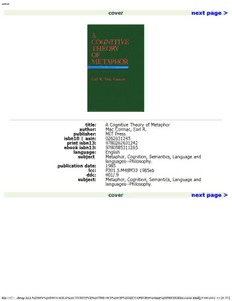
A Cognitive Theory of Metaphor PDF
284 Pages·1985·1.647 MB·English
Most books are stored in the elastic cloud where traffic is expensive. For this reason, we have a limit on daily download.
Preview A Cognitive Theory of Metaphor
Description:
In this book, Earl Mac Cormac presents an original and unified cognitive theory of metaphor using philosophical arguments which draw upon evidence from psychological experiments and theories. He notes that implications of this theory for meaning and truth with specific attention to metaphor as a speech act, the iconic meaning of metaphor, and the development of a four-valued system of truth. Numerous examples of metaphor from poetry and science are presented and analyzed to support Mac Cormac's theory."A Cognitive Theory of Metaphor takes up three levels of explanation--metaphor as expressed in surface language, the semantics of metaphor, and metaphor as a cogitive process--and unifies these by interpreting metaphor as an evolutionary knowledge process in which metaphors mediate between minds and culture. Mac Cormac considers, and rejects, the radical theory that all use of language is metaphorical; however, this argument also recognizes that the "theory of metaphor may itself be metaphorical.The book first considers the computational metaphor often adopted by cognitive psychology as an example of metaphor requiring analysis. In contrast to three well-known philosophical theories of metaphor - the tension theory, the controversion theory, and the grammatical deviance theory - it develops a semantical anomaly theory of metaphor based on a quasi-mathematical hierarchy of words. In developing the theory, Mac Cormac makes much-needed connections between theories of metaphor and more orthodox analytic philosophy of meaning, including discussions of speech acts and the logic of fuzzy sets. This semantical theory of explanation is then shown to be compatible with contemporary psychologicaltheories of memory.Earl R. MacCormac is Charles A. Dana Professor of Philosophy and Chairman of the Department of Philosophy, Davidson College. A Bradford Book.
See more
The list of books you might like
Most books are stored in the elastic cloud where traffic is expensive. For this reason, we have a limit on daily download.
